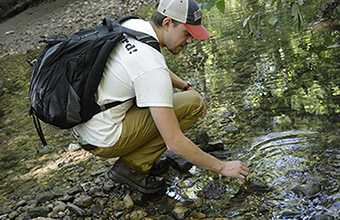College of Arts and Sciences Newsroom

Sustainability Graduate Certificate
The University of Dayton will launch a graduate certificate in sustainability studies in January, expanding the College of Arts and Science's recently created sustainability studies program beyond the sustainability, energy and the environment minor established in 2010.
Foundations in Sustainability, the required introductory course in the new graduate certificate curriculum, will be taught for the first time during the spring 2018 semester. Plans call for the new capstone course, Applied Sustainability, to be offered during the 2018-19 academic year. Students also take two elective courses or receive approval for up to six semester hours of applicable coursework to complete the 12-semester hour certificate.
The certificate can be completed in two or more semesters, with many classes starting at 4:30 p.m. or later. Applicants must have a bachelor’s degree or its equivalent to be accepted into the certificate program.
Sustainability studies is the College’s first new academic program since 1998, when the University established the nation’s first undergraduate human rights studies program. Housed in the University of Dayton Hanley Sustainability Institute, the program was founded this year to support the SEE minor and create the sustainability graduate certificate and a proposed sustainability studies major.
Sustainability is one of three research focus areas outlined by University President Eric F. Spina in his 2016 inaugural address, in which he called on faculty and students to help build sustainable communities and create a more sustainable environment to advance the common good.
“The graduate certificate recognizes that many of our students want to expand their understanding of sustainability issues and how they can play a role in addressing the environmental crisis,” said Danielle Poe, associate dean for curriculum and academic outcomes.
Poe said the certificate will also be promoted within the Dayton community in response to the growing number of jobs that seek employees with an understanding of sustainable practices and sustainability analysis.
People who complete the certificate will gain an advantage in securing a job within the growing fields of sustainable management, development, education and outreach, said Rebecca Potter, sustainability studies program director.
“It is hard for me to imagine a sector that is not engaging with sustainability right now in some way,” Potter said.
The certificate curriculum provides a transdisciplinary approach, drawing on dozens of faculty from across the University and allowing people who hold a bachelor’s degree in any academic discipline to explore how their expertise intersects with the study of sustainability.
“Students from across the University, whether they’re pursuing a master’s in public administration or a doctorate in biology, can use courses from within their program and within the certificate to learn a valuable and unique skill set,” Poe said. “Further, students who are pursuing the certificate but not an advanced degree can work with Dr. Potter to create a program of study that will directly apply to their career or career aspirations.”
The Foundations in Sustainability course considers the social, environmental and economic aspects of sustainable communities, and addresses how to consider environmental challenges to a community in a systematic way. It also will discuss the major concepts and texts that are coming to define the field of sustainability, including Pope Francis’ Laudato Si, an encyclical on environmental stewardship, and Rachel Carson’s environmental science classic, Silent Spring.
Potter, an associate professor of English, was a 2014 visiting scholar at the Rachel Carson Center for Environment and Culture in Munich, Germany.
“It’s not a doctorate or master’s degree, but it does lay the groundwork in giving you an understanding of the field and ways to apply sustainability concepts in your specific interest,” Potter said.
The College started developing the graduate certificate in 2015.
For more information or to apply for the certificate program, please visit the sustainability studies program website.
- Dave Larsen, communication coordinator, College of Arts and Sciences
